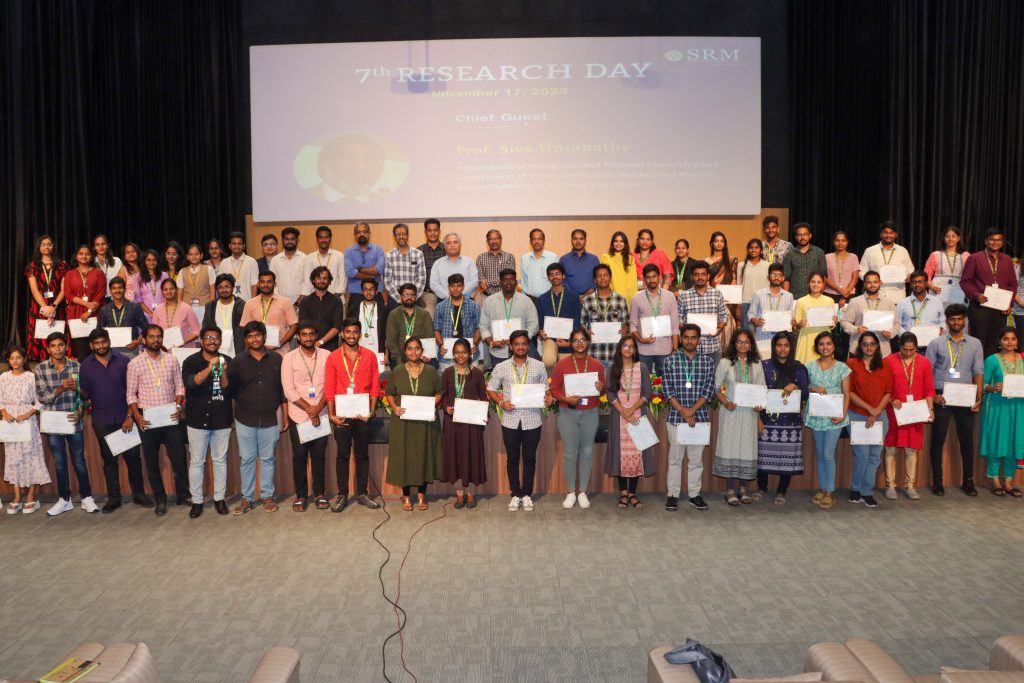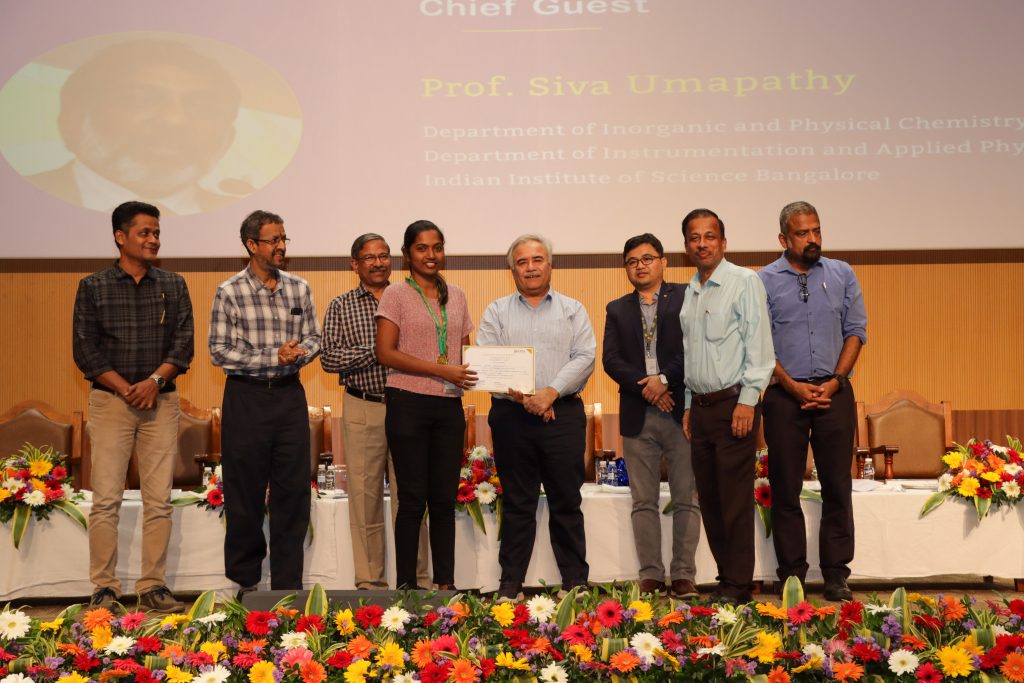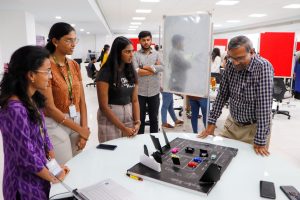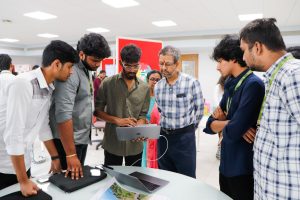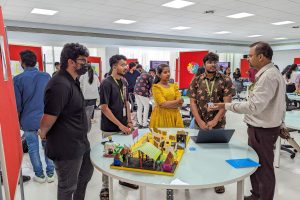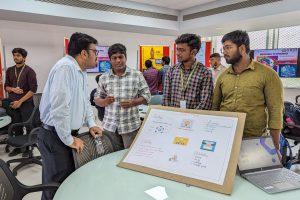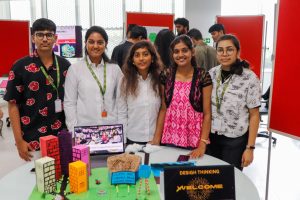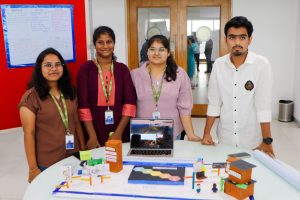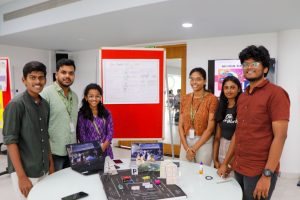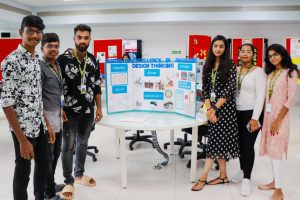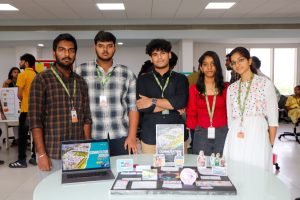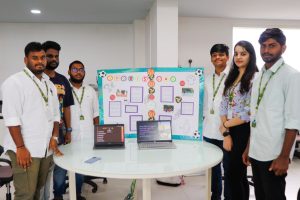All Management Events
- Physics Duo Publish in Prestigious Journal November 30, 2023
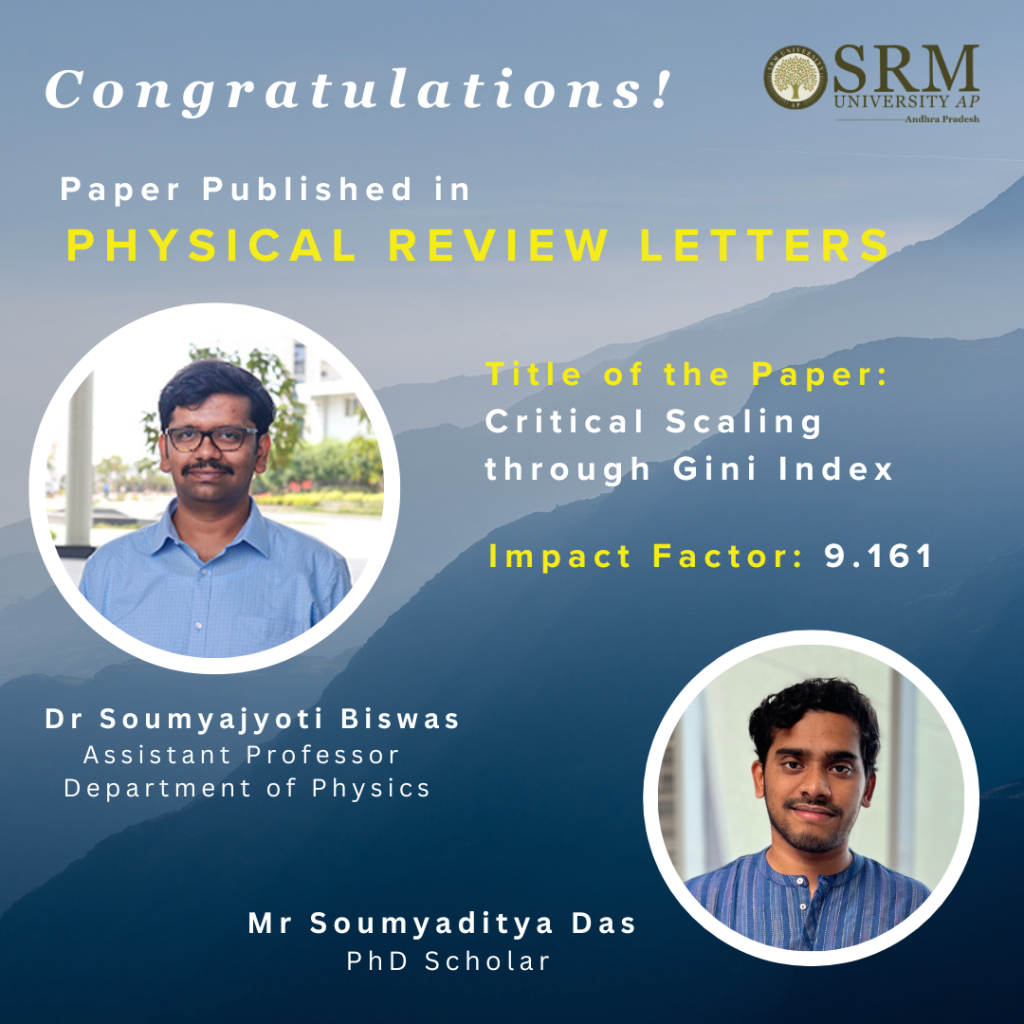
Dr Soumyajyoti Biswas, Assistant Professor in the Department of Physics, along with his Doctoral Scholar, Mr Soumyaditya Das, have presented groundbreaking findings through their research work titled “Critical Scaling through Gini Index”. The research paper was featured in the prestigious Physical Review Letters, which has an impact factor of 9.161.
Abstract
In the systems showing critical behaviour, various response functions have a singularity at the critical point. Therefore, as the driving field is tuned toward its critical value, the response functions change drastically, typically diverging with universal critical exponents. In this Letter, we quantify the inequality of response functions with measures traditionally used in economics, namely by constructing a Lorenz curve and calculating the corresponding Gini index. The scaling of such a response function, when written in terms of the Gini index, shows singularity at a point that is at least as universal as the corresponding critical exponent. The critical scaling, therefore, becomes a single parameter fit, which is a considerable simplification from the usual form where the critical point and critical exponents are independent. We also show that another measure of inequality, the Kolkata index, crosses the Gini index at a point just prior to the critical point. Therefore, monitoring these two inequality indices for a system where the critical point is not known can produce a precursory signal for imminent criticality. This could be useful in many systems, including condensed matter, bio- and geophysics to atmospheric physics. The generality and numerical validity of the calculations are shown with the Monte Carlo simulations of the two-dimensional Ising model, site percolation on the square lattice, and the fibre bundle model of fracture.

Fig.1: Shows the crossing point of the Gini index and the Kolkata index prior to critical point for three different models (from left Ising model in 2d, site percolation in 2d and fiber bundle model of fracture) form both side of critical point.
Collaborations and Future Plans
This work essentially builds a framework for indicating imminent critical points for any system. Therefore, in situations where such knowledge is vital, for example, in the fracture of solids, the method is going to be highly useful in forecasting the failure point. We are in the process of working with our collaborators at the University of Barcelona to experimentally verifying our methods for the compressive failure of porous samples. This is a significant first step towards opening new pathways in forecasting fracture points in disordered materials that could have an impact on laboratory-scale fractures to large constructions and eventually to earthquakes.
We wish the teacher-student duo many more fulfilling and enriching research endeavours in future!
Continue reading → - Utilising Social Media Platforms for Crisis Management November 29, 2023
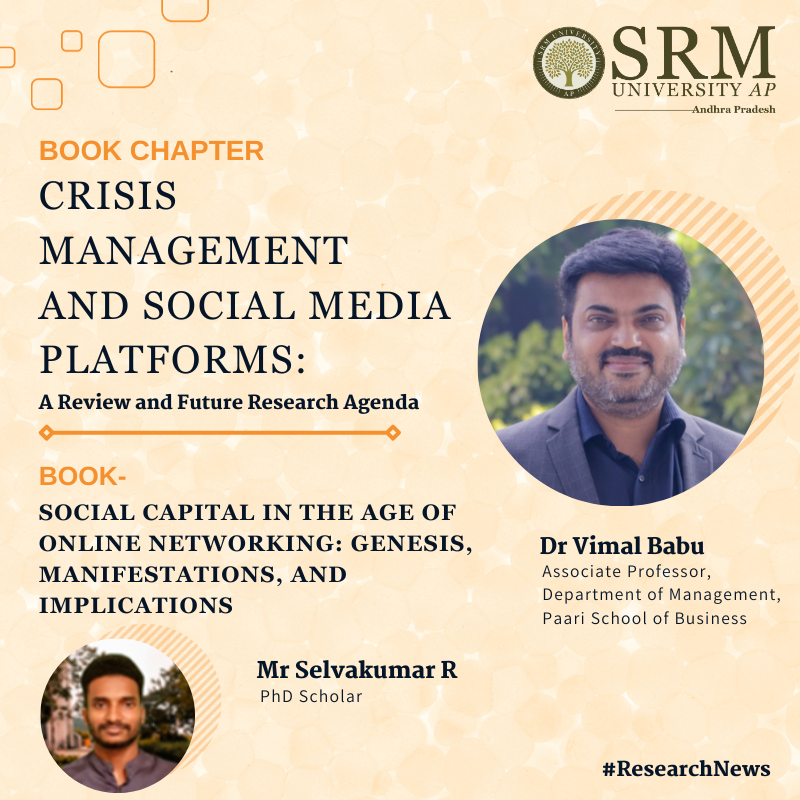
Dr Vimal Babu, Associate Professor and Mr Selvakumar R, Research Scholar from the Department of Management, Paari School of Business has published a fascinating book chapter titled “Crisis Management and Social Media Platforms: A Review and Future Research Agenda” in the book Social Capital in the Age of Online Networking: Genesis, Manifestations, and Implications examining their perspectives on the ever-changing digital ecosystem and its repercussions.
In this chapter, we research duo has made a concerted effort to advance the understanding of crisis management using social media platforms (Social networking sites). Crisis management encompasses a broader spectrum of crisis leadership, and utilising social media platforms (SMPs) for crisis management (CM) has become the modern approach to handling crisis events. Recognising the importance of exploring and advancing crisis leadership concepts to enhance the existing body of knowledge, his work is the first to employ a bibliometric approach to investigate this area, contributing to the nascent literature on the subject. The unique insights garnered from this analysis are expected to provide valuable guidance to researchers and scholars interested in this emerging field.
The book “Social Capital in the Age of Online Networking” digs into the fascinating growth of relationships and connections in the virtual sphere in a digital era when clicks matter as much as handshakes. This edited volume reveals the pattern of our modern networked society, linking theoretical ideas and real-world implementations. The book’s objective is to provide a comprehensive understanding of the current and prospective state of theory and applications of this phenomenon, and it will benefit researchers, government and private research institutions, business corporations, and students in various fields such as business, economics, information technology, psychology, medicine, and humanities.
Continue reading → - Exploring the Dynamics of Democracy and Foreign Policy November 29, 2023
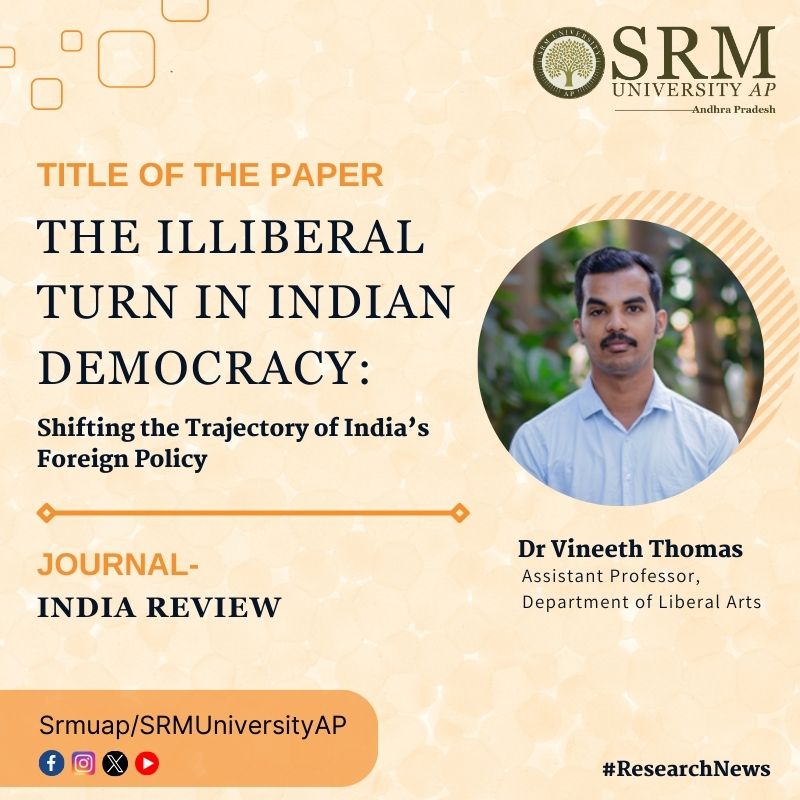
Dive into the intricate realms of Indian democracy and its ever-evolving foreign policy with a compelling research paper by Dr Vineeth Thomas, Assistant Professor, Department of Liberal Arts. The university is happy to announce the publication of Dr Thomas’ latest work, titled “The Illiberal Turn in Indian Democracy: Shifting the Trajectory of India’s Foreign Policy“, in the prestigious Q2 Journal “India Review“.
The paper is a profound exploration of the dynamic shifts in India’s foreign policy, drawing attention to the complexities of the nation’s democratic journey. His research delves into the nuanced interplay of domestic politics and global diplomacy, providing fresh perspectives on the illiberal turn in India’s democratic trajectory. The insightful work takes on a thought-provoking journey into the evolving facets of Indian democracy and the intricate interplay between domestic politics and foreign policy.
Abstract
Long-standing democracies such as India were not exempt from the global trend of democratic retreat. India has come under increasing international attention due to certain domestic policies such as the revocation of Article 370 of the Indian Constitution, the National Register of Citizens and Citizenship (Amendment) Act passed under the Bharatiya Janata Party government. In addition to India’s democratic decline being reflected in global democratic rankings, this has induced strains on India’s foreign relations. In its pursuit of becoming a leading power, India’s perceived democratic backsliding is likely to influence the direction of its foreign policy. To discern the impact of its perceived illiberal turn on its foreign engagement, the role of democracy in India’s foreign policy needs to be explored. While attempts have been made to understand democratic backsliding through a theoretical lens, the impact of a nation’s democratic status on its foreign relations and policy remains a largely unexplored area.
This study will help to understand how India’s democratic backsliding can induce a shift in its foreign policy.
Continue reading → - Vice Chancellor Prof. Manoj K Arora Honoured with Bhaskar Award November 29, 2023
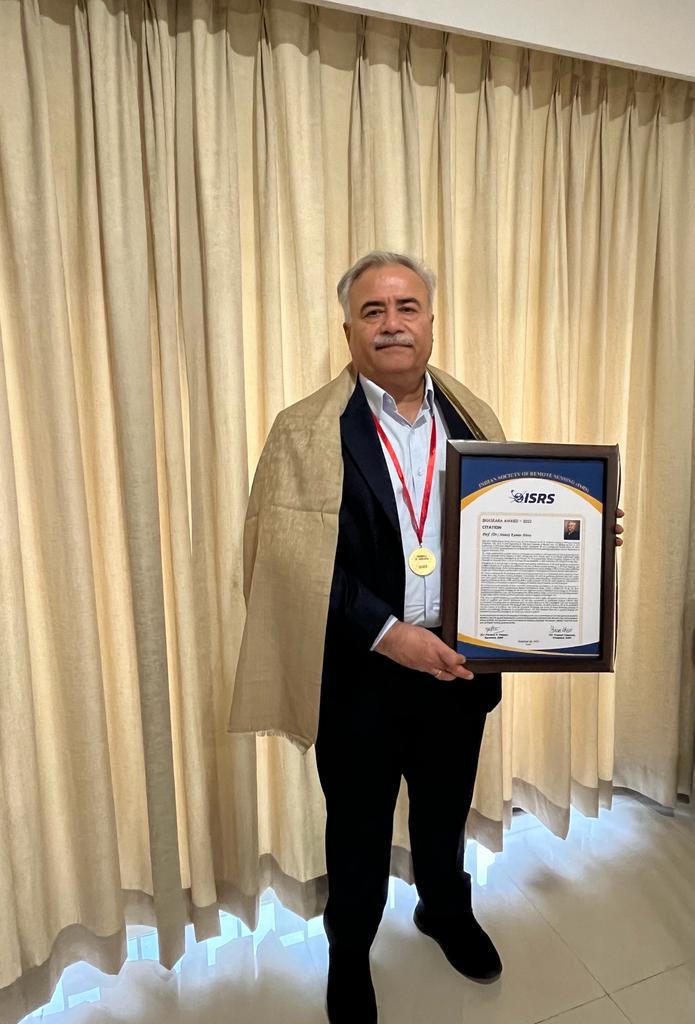
Vice Chancellor, Prof. Manoj K. Arora has been honoured with the Bhaskar Award, the highest recognition by the Indian Society of Remote Sensing. The award consists of a medal, citation and Rs. 2,00,000/-. The award was conferred to Prof. Arora by Dr Shailesh Naik, Former Secretary of the Ministry of Earth Sciences and Dr Prakash Chauhan, Director-National Remote Sensing Centre; President of the Indian Society of Remote Sensing during the ISG-ISRS Annual Convention & National Symposium on the theme “GeoDiscover: Unravelling India’s Spatial Frontier”, held on Nov 28, 2023 in Pune.
Prof. Manoj K Arora said, “I am thrilled to receive the coveted Bhaskar Award and to be in the league of great fellow Bhaskar Awardees who have contributed immensely to the Indian Space Programme. I dedicate this award to my teachers, mentors and students.” The award has been given in recognition of his outstanding contribution and achievements in the fields of Remote Sensing, Digital Image Processing, Land Cover Mapping, Earth Sciences and Civil Engineering applications.
Some of the other awardees in this league are Mr Somanath, current ISRO Chairman, former ISRO Chairmen, Dr Radha Krishnan, Dr Kiran Kumar, Dr K Sivan, former Secretary of Ministry of Earth Sciences, Dr Shailesh Nayak, Chief guest of the event and Former Surveyor General of India, Dr Prithvish Nag, to name a few.
Prof. Arora has done pioneer work in extracting accurate land cover information from a variety of remote sensing data using Machine Learning techniques. In particular, his work on generating fractional land cover images from coarse spatial resolution images (fraught with mixed pixels) using neuro-fuzzy classification and super-resolution mapping techniques in the late 1990s and early 2000s is widely acclaimed. He is one of the harbingers in using fuzzy set and pattern recognition techniques for landslide hazard zonation and risk assessment.
His works on accurate extraction of snow cover from remote sensing and estimation of snow depths are being used at an operational level in the Defence Geoinformatics Research Establishment (earlier SASE), a DRDO lab. He has also been involved in the use of geospatial techniques for the rail route alignment surveys of Rishikesh Karna Prayag and Annandpur Sahib Badrinath Railway Lines, and the prestigious Char Dham Railway Project of Government of India being executed by Rail Vikas Nigam Limited, and Drone surveys for cadastral mapping of Chandigarh City.
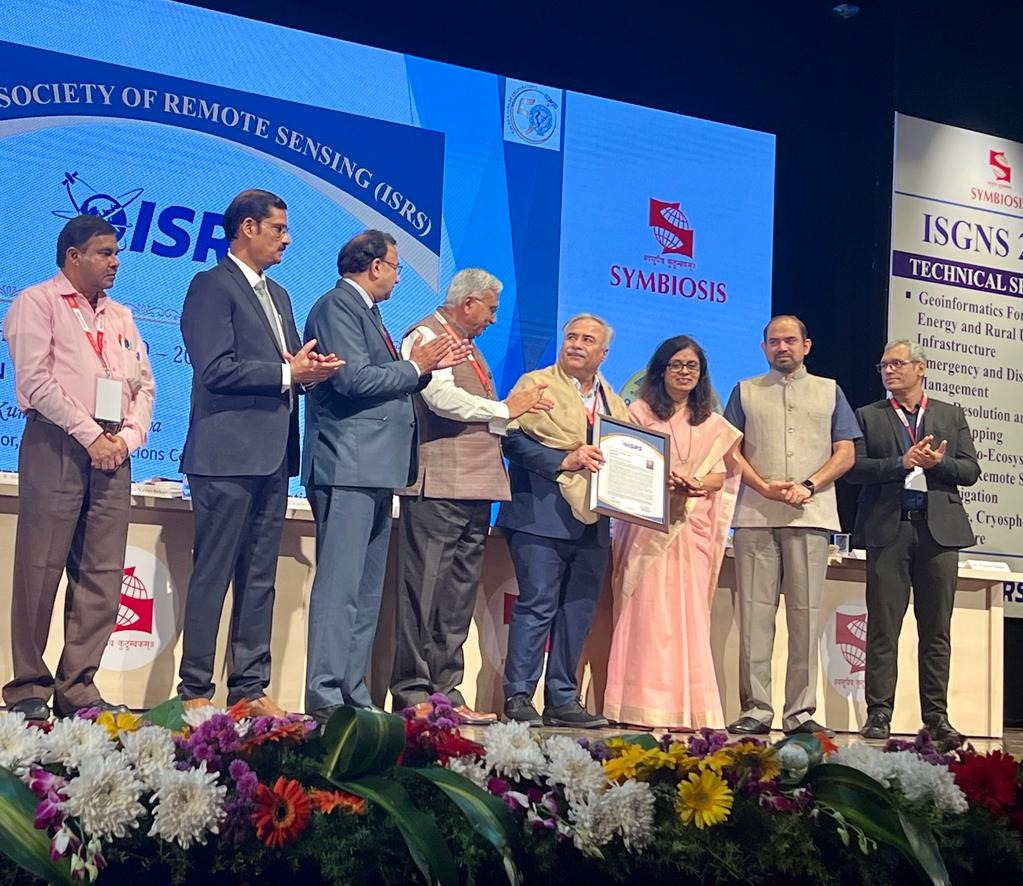
Some of his other works recognised by the scientific community are; the accuracy assessment of fuzzy classification, detection of surface; sub-surface military targets using hyperspectral and microwave remote sensing data, development of models for landslide movement estimation at a spatial level as well as at individual landslide level using PS InSAR and SBAS techniques, and development of Object Based Image Analysis model for mapping glacier cover classes and land use in general from high spatial resolution remote sensing data.
Prof. Arora is equally contributing to academic administration to mentor higher educational institutions, departments, centres of excellence and research laboratories. He has been instrumental in establishing the Kalpana Chawla Chair of Geospatial Technology from an endowment given by Indian Railways at PEC Chandigarh and Atal Community Innovation Centre (ACIC) from the Niti Aayog at BML Munjal University. At SRM University-AP, he has established two new Centres of Excellence, viz, Centre for Geospatial Technology and Centre for Drone Technology focusing on product and technology development in Geospatial Sciences.
“Prof. Arora is a visionary leader and committed researcher under whose guidance the university has flourished as a research-intensive institute, embarking on novel frontiers of cutting-edge research. We at SRM University-AP heartily congratulate Prof. Arora for his worthy achievement and are elated to witness his future contributions to the field of Remote Sensing,” remarked Dr P Sathyanarayanan, Pro-Chancellor, SRM University-AP.
SRM University-AP is proud and ecstatic to have him as its leader.
Continue reading → - “A Celebration of Research”: 7th Research Day at SRM University-AP November 29, 2023
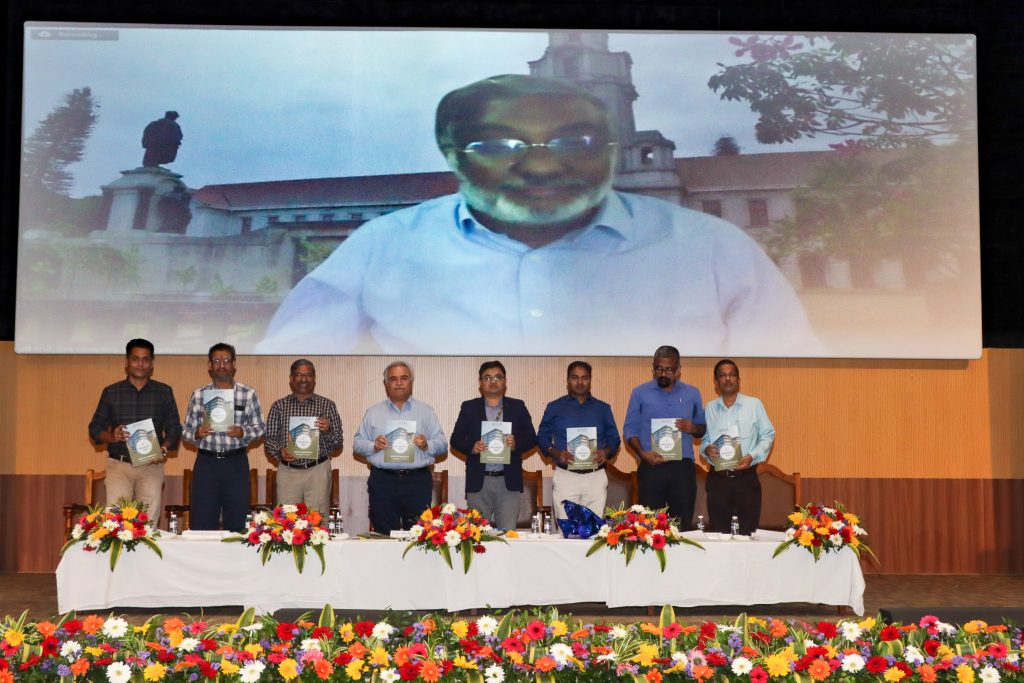
“Motivating young potential minds to pursue research and nurture a scientific career defines the true meaning of research”, said Prof. Siva Umapathy, Senior Professor at the Department of Inorganic and Physical Chemistry, Indian Institute of Sciences, Bengaluru, in his distinguished speech as the chief guest for Research Day at SRM University-AP.
The varsity celebrated the 7th Research Day on November 17, 2023, in the august presence of Prof. Siva Umapathy, Chief Guest (virtual mode), Prof. Manoj K Arora, Vice Chancellor; Dr R Premkumar, Registrar; Prof. Ranjit Thapa, Dean Research; Deans and Associate Deans of SRM University-AP. Faculty, scholars, students and researchers graced the event commemorating research excellence by young potential minds. Prof. Umapathy emphasised the significance of research in undergraduate studies in his address by stating that, “True advancement in research occurs when you gain depth in your area of study and utilise the knowledge to pursue innovation”.
Prof. Ranjit Thapa remarked that research is an essential pillar of the university that has contributed to the university’s growth as a world-class research-intensive institute. He highlighted that with 1760+ journal publications with 50% in Q1 journals, 41 Nature Index publications, 155 patents published and 10 granted, industry and research projects with an outlay of 29+ crores, 50+ research laboratories, 300+ research scholars, the university has achieved unprecedented success in the research frontier within a span of 6 years. The Deans of all schools also presented a brief report on the research activities and significant achievements of their faculty at the event.
Vice Chancellor, Prof. Manoj K Arora lauded the university’s mission to provide research- centric education for its students. “At SRM University-AP, we encourage cutting-edge translational research and provide financial and technical support for students to rise to the global frontiers of breakthrough research. The university offers expert faculty, top-notch facilities and a research-driven curriculum designed to build a thriving innovative ecosystem”, remarked Prof. Arora.
A paper presentation contest was held as part of the Research Day. 200+ abstracts in the undergraduate/postgraduate category and 80+ abstracts in the PhD category were received from young researchers in various areas of research ranging from AI/ML to Environment and Sustainability, from Literature, Linguistics, Culture & Gender to Nanotechnology and Physical Sciences. Winners of the paper presentations were awarded with Gold and Silver medals with special mention of appreciation for their guides and mentors. The unveiling of the Abstract Book, with over 300 abstracts received from the participating researchers, was a highlight of the event.
Chief Guest, Prof. Siva Umapathy was virtually honoured with a memento as a token of appreciation by the dignitaries. Dr R Premkumar delivered the vote of thanks expressing his sincere gratitude towards the chief guest and the convenors of the Research Day. SRM University-AP hosted the 7th Research Day with great fervour to maintain the spirit of research among young students and nurture an innovative and conducive research ecosystem.
Continue reading → - Vice Chancellor of SRMUAP honoured with Bhaskar Award November 29, 2023
CVR News
Continue reading →
Deccan Chronicle
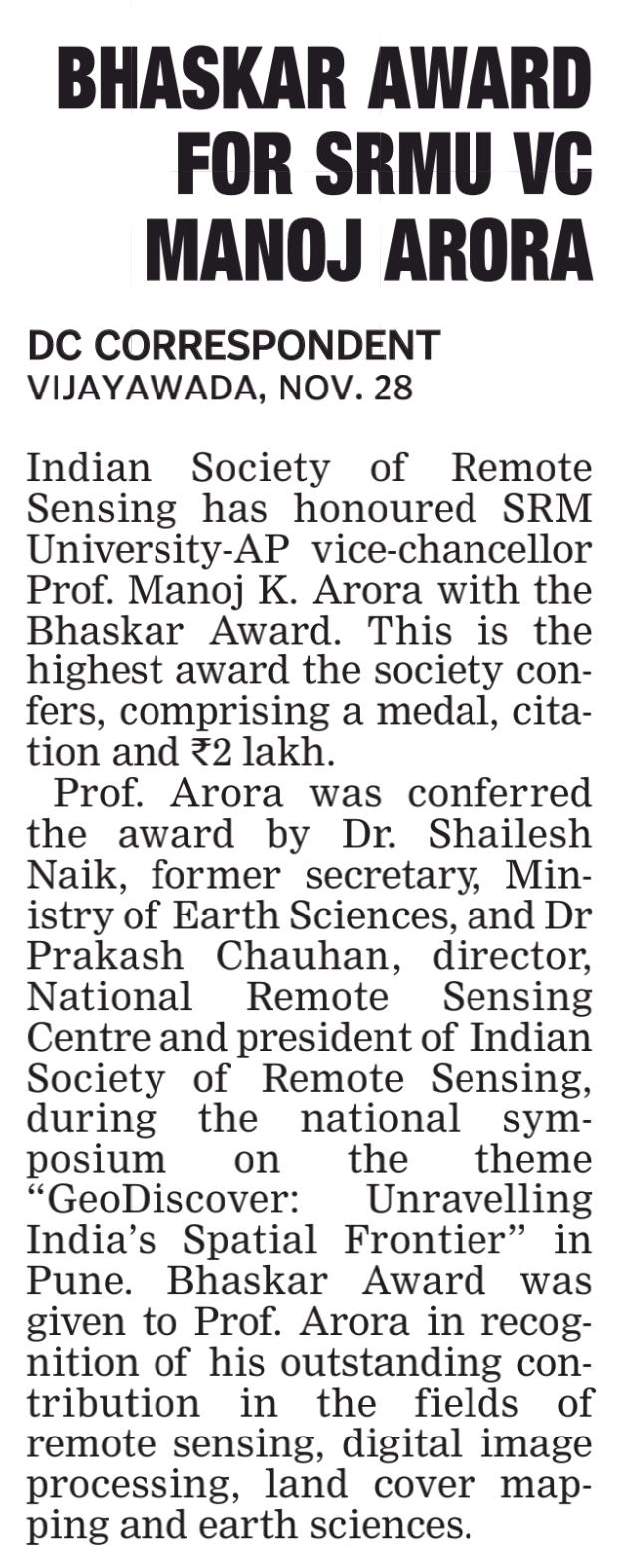
The Hindu
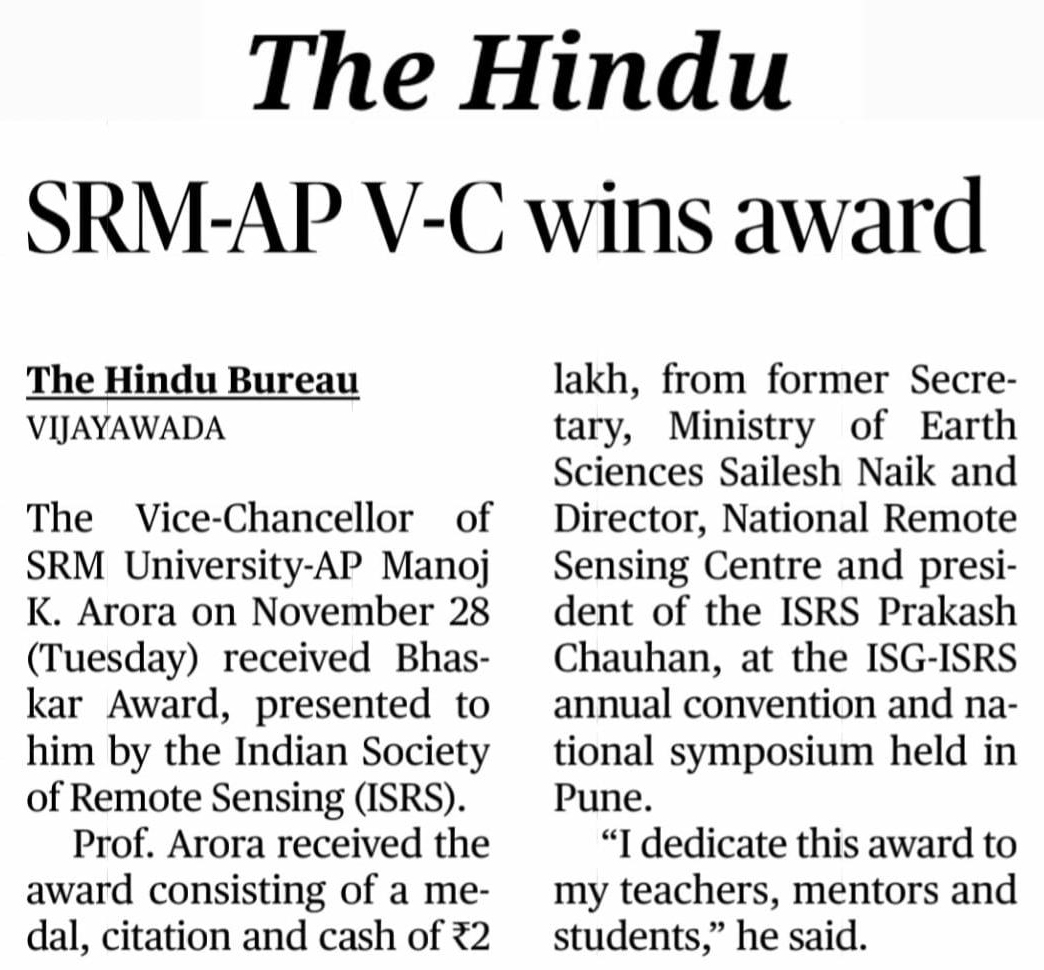
The News Indian Express
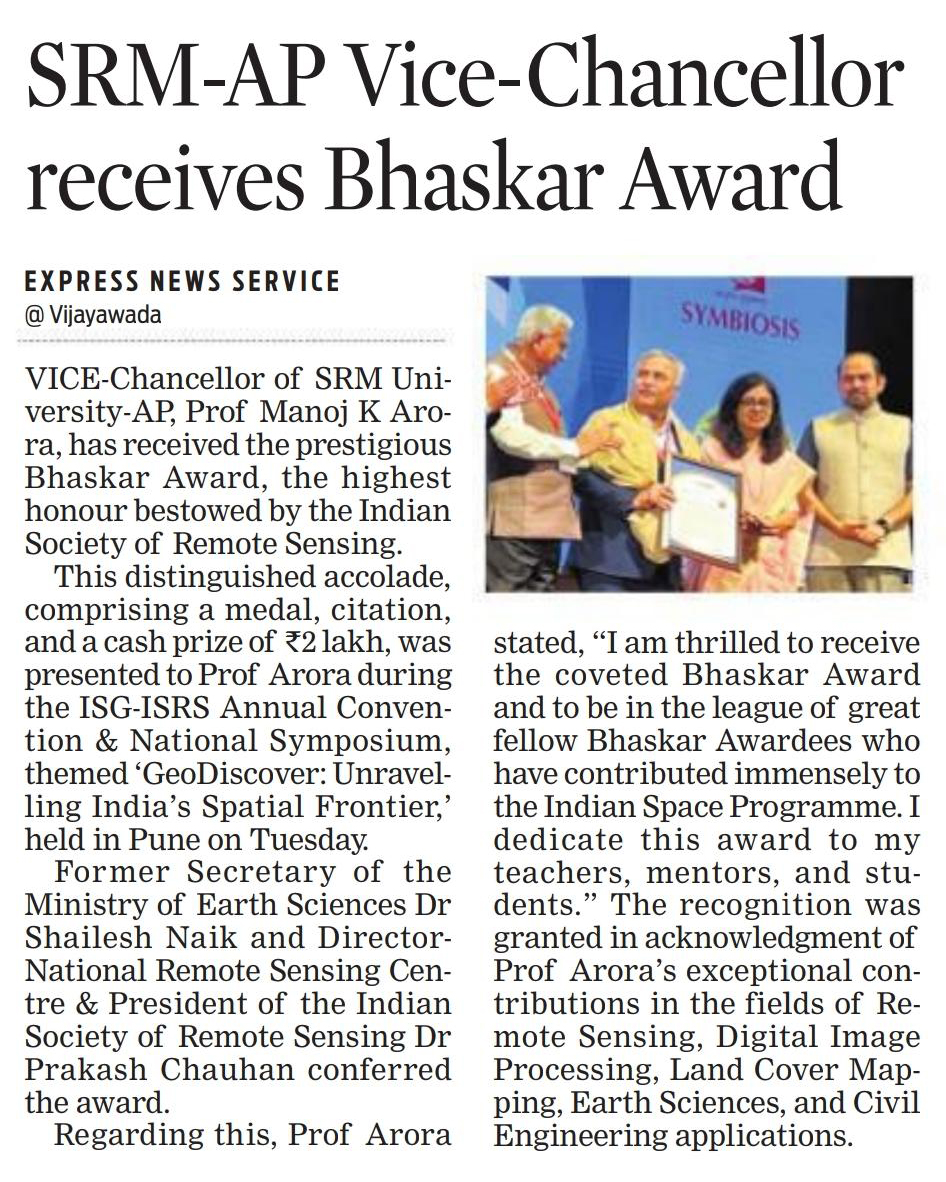
The Hans India
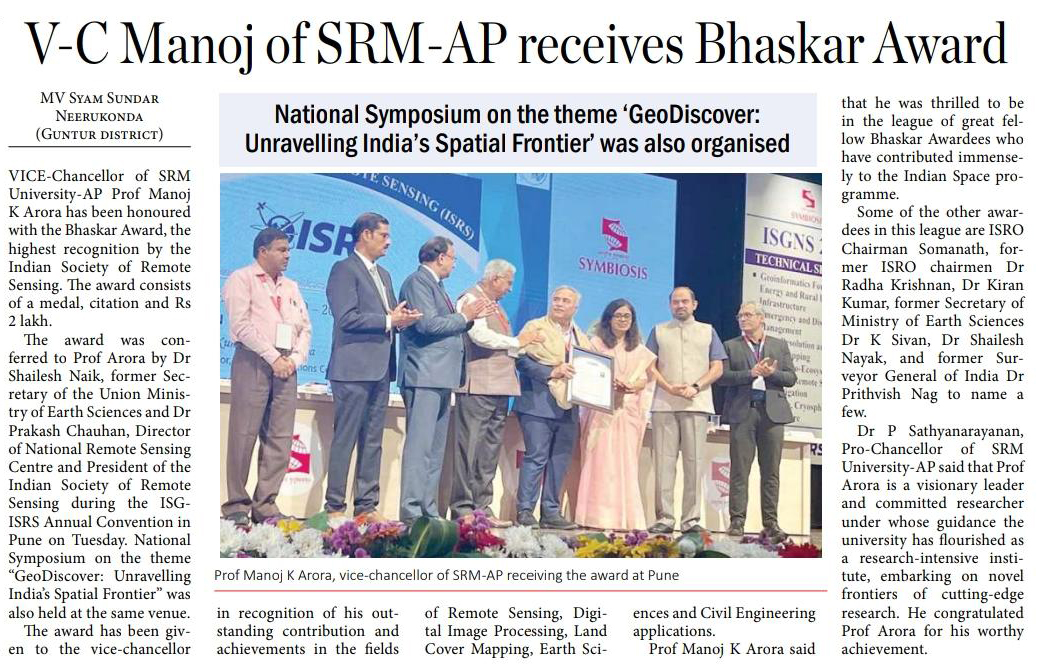
The Knowledge Review
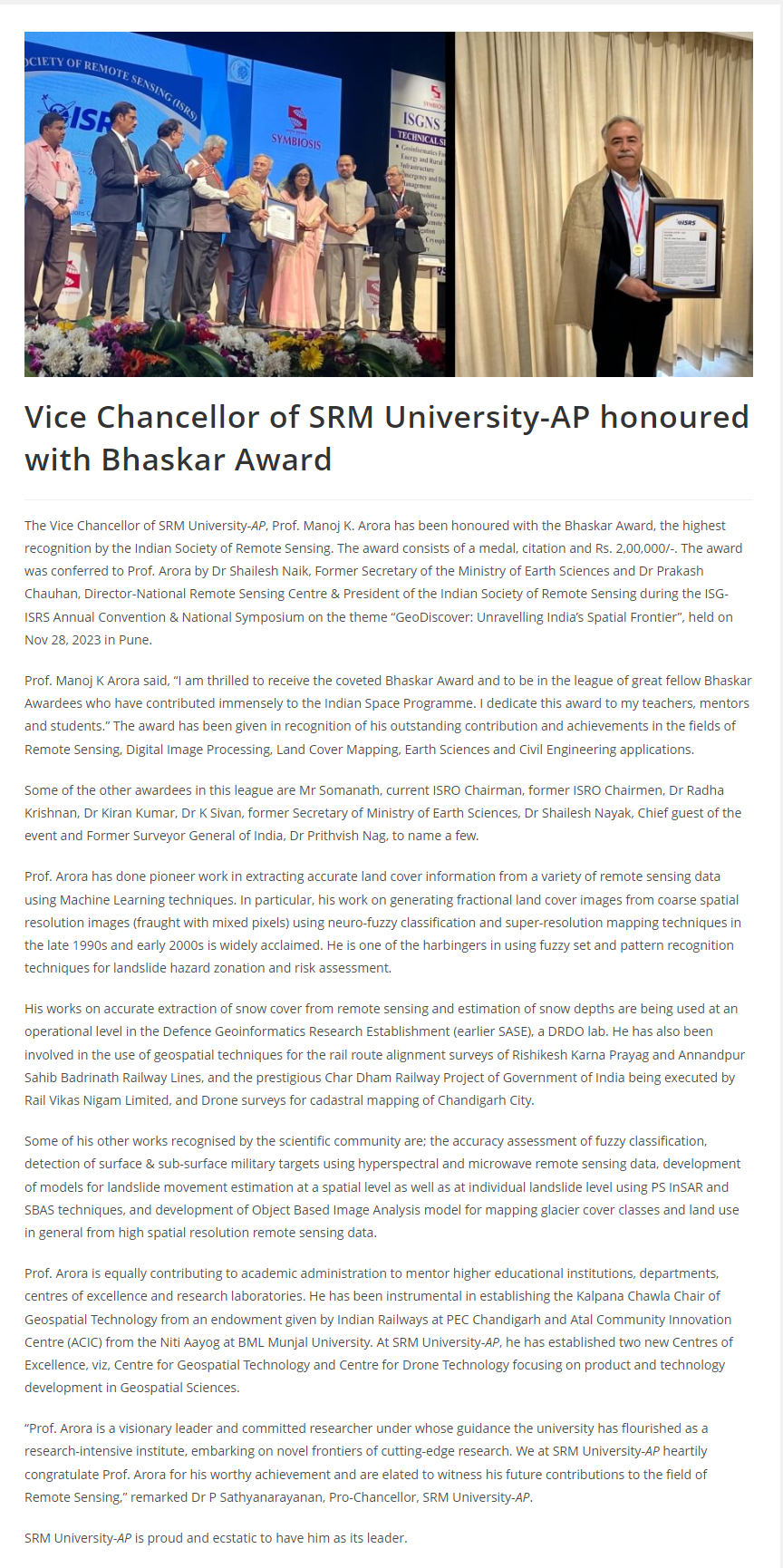
The Pioneer
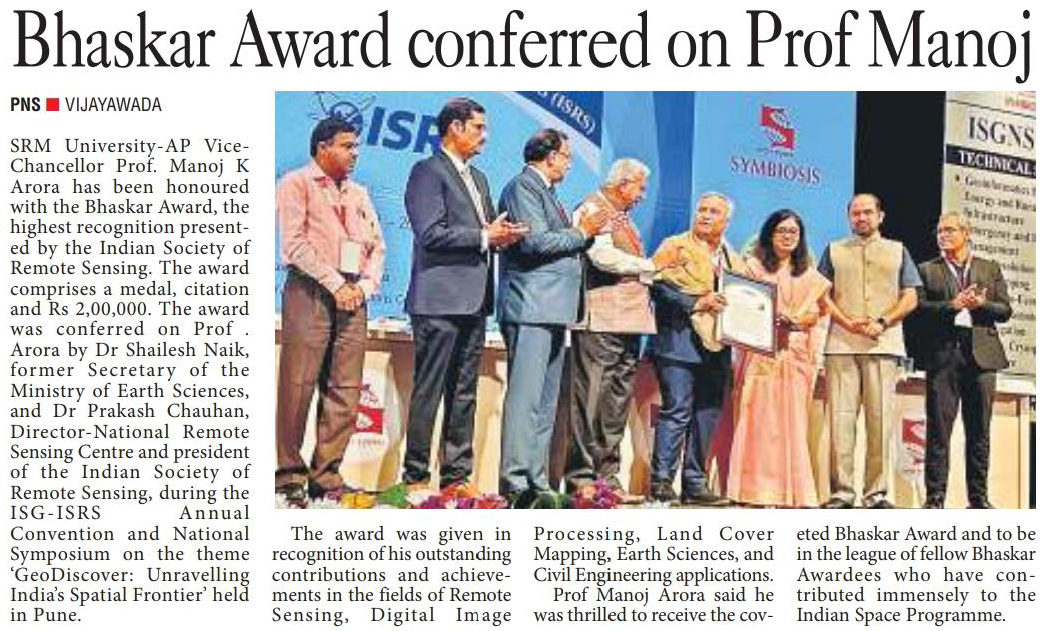
Prajasakthi
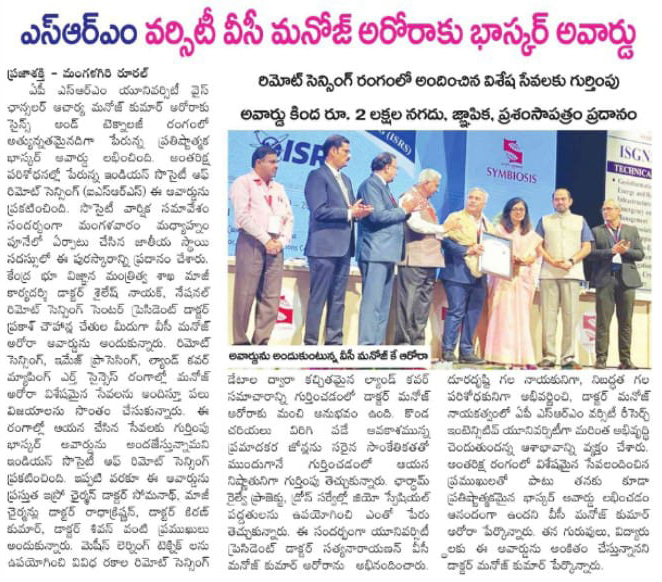
Visalaandhra
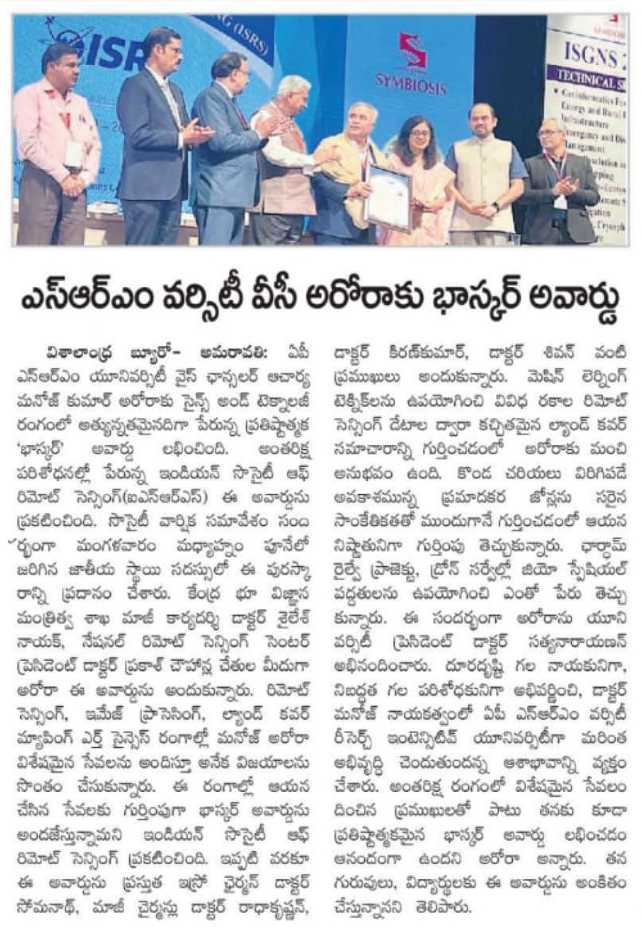
Andhra Prabha
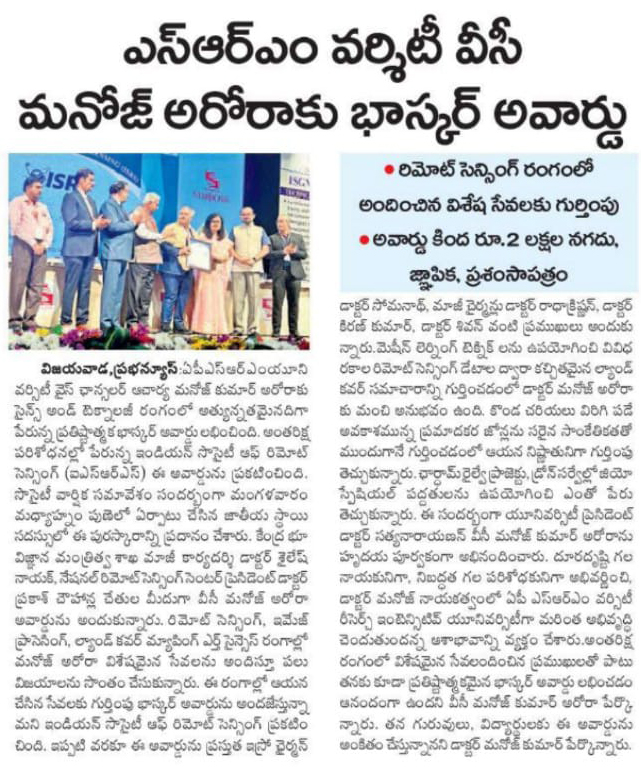
Vartha
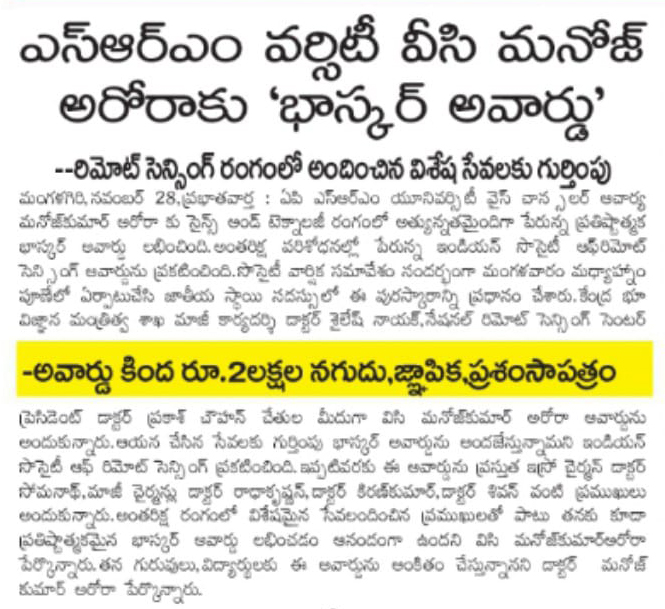
Andhra Patrika
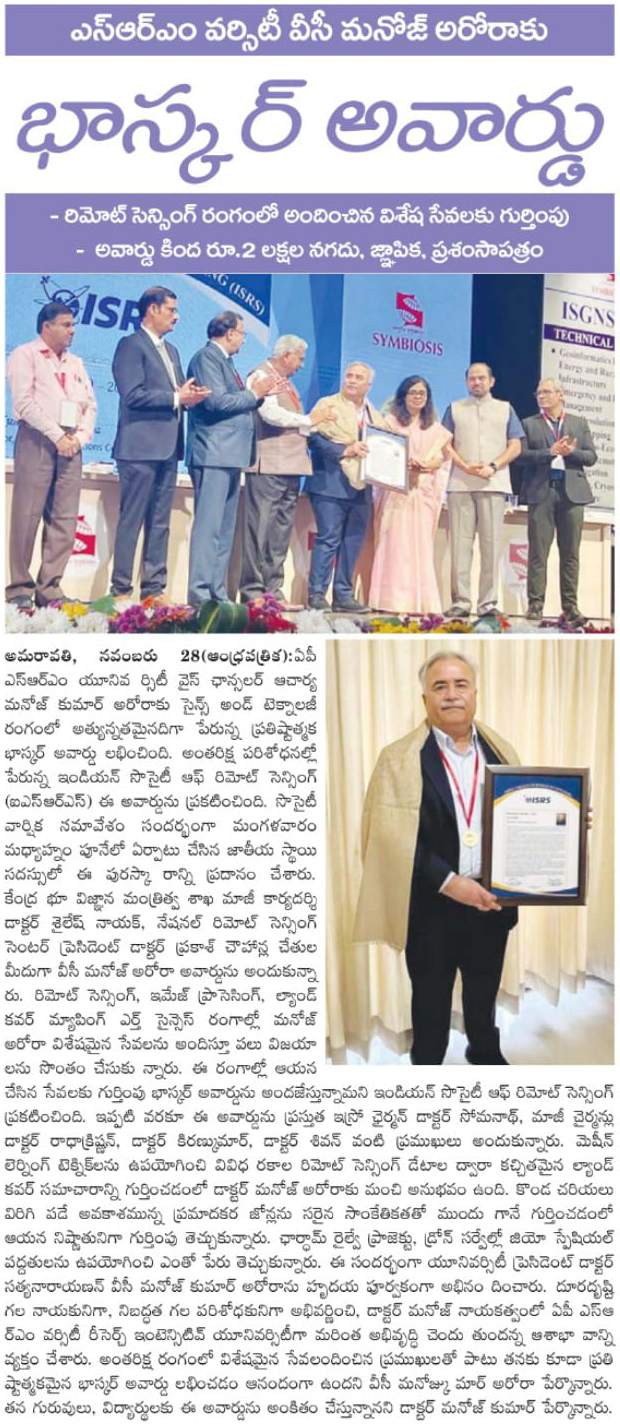
Eenadu
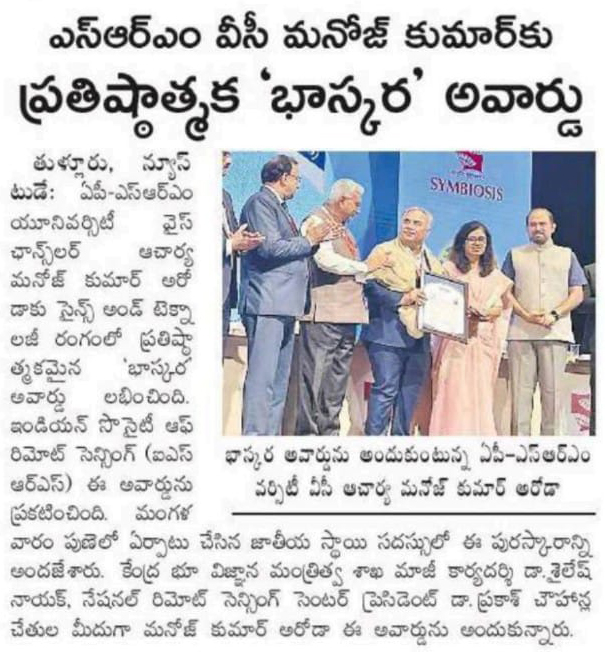
Andhra Jyothi
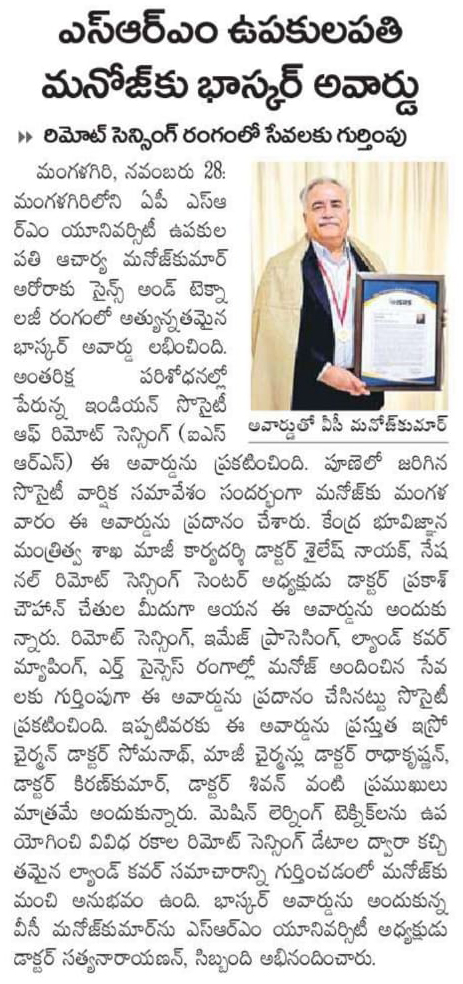
- Exhibition on Design Thinking Projects November 28, 2023
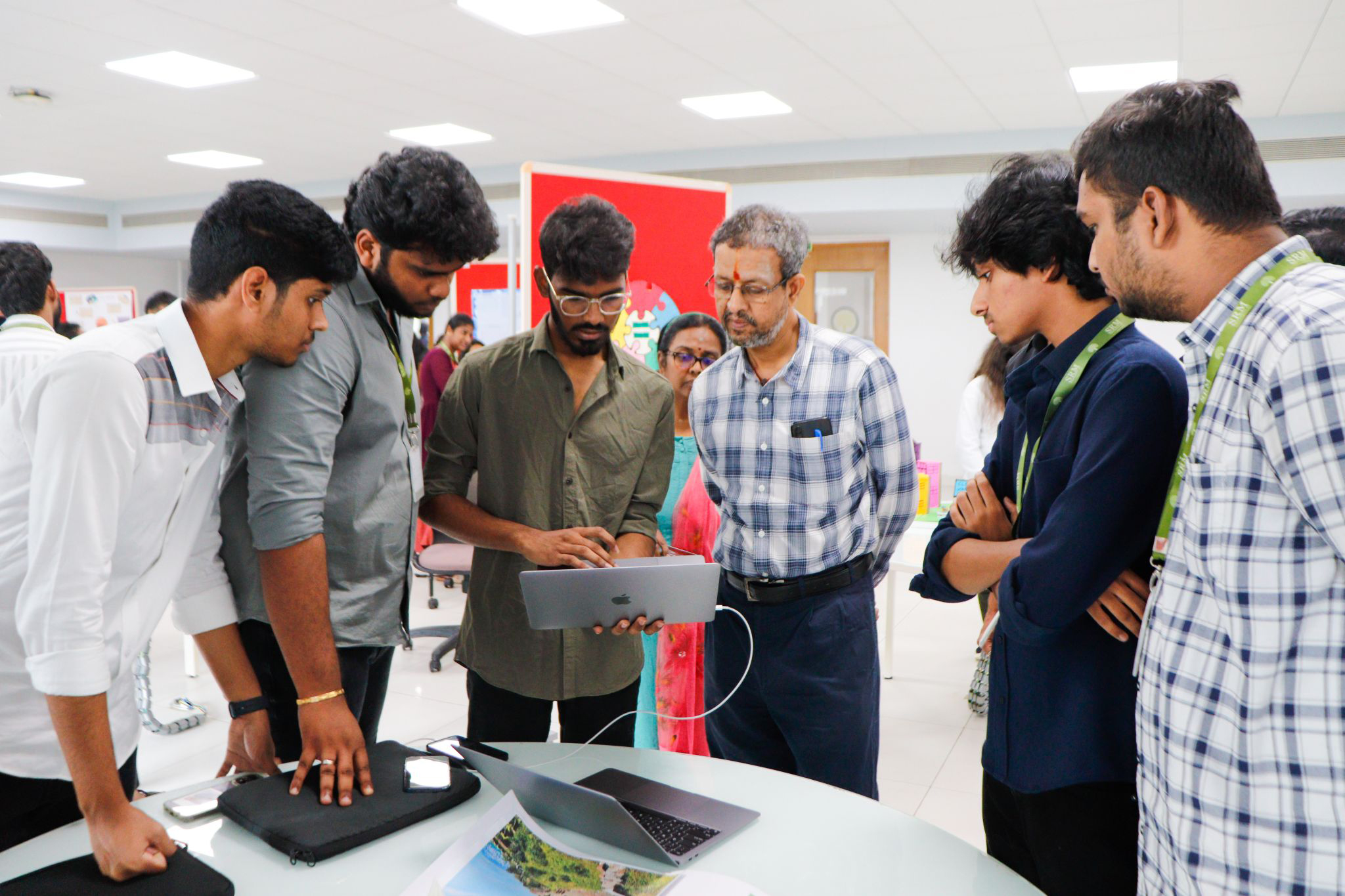
The Paari School of Business organised an exhibition on projects developed by students of the BBA (Hons) programme on the concepts of Design Thinking as a part of their course curriculum. Students exhibited their work to Dr Premkumar R, Registrar; Prof. Bharadhwaj Sivakumaran Dean; Dr Vimal Babu Ph.D. and Mr ARUN PRASAD GS, Faculty of Paari School of Business and students of the varsity.
The exhibition was a successful platform for students to display their knowledge and understanding of Design Thinking and have constructive discourse on this novel and innovative topic!
Continue reading → - SRM University-AP Excels at National Level Inter-Engineering College Sports Competition November 24, 2023
DNP Education
Continue reading →
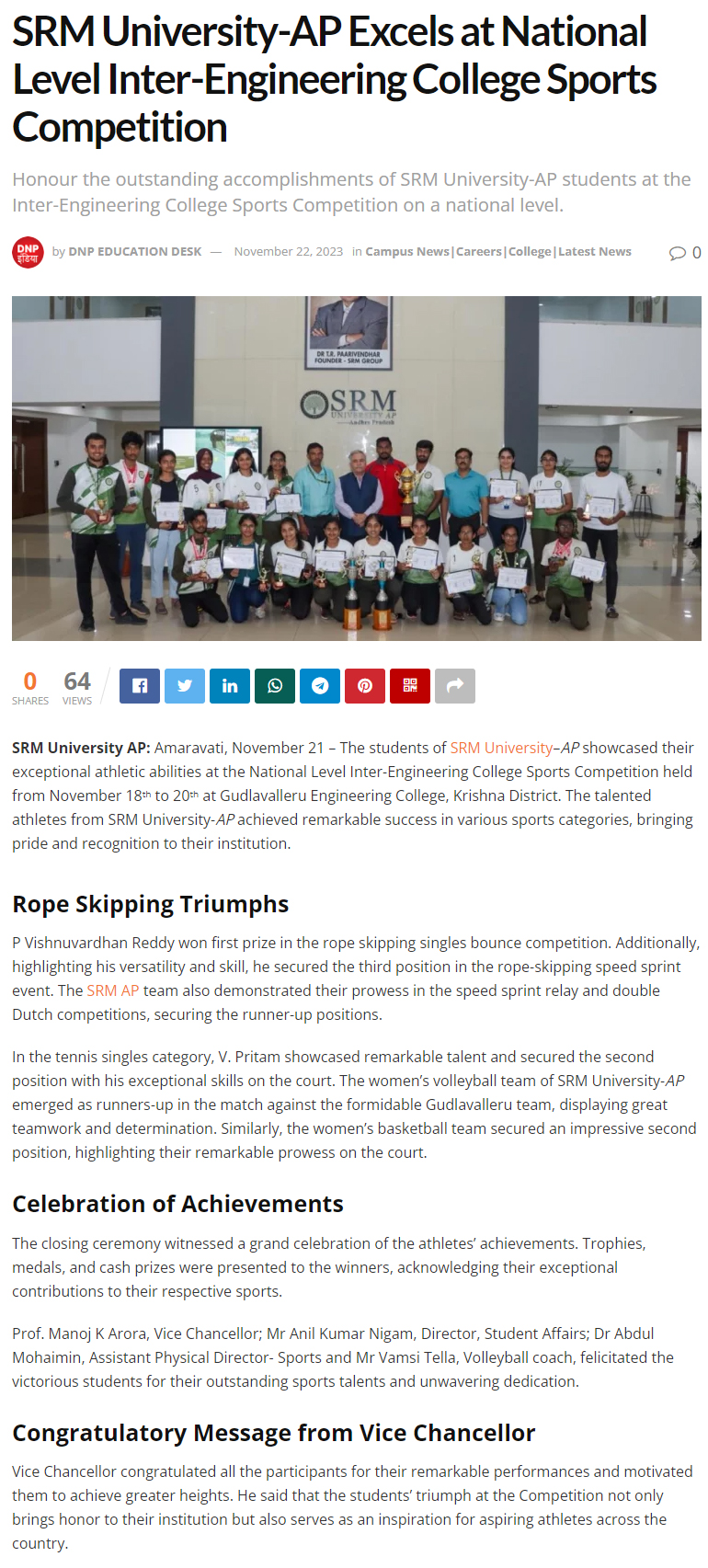
DNP India
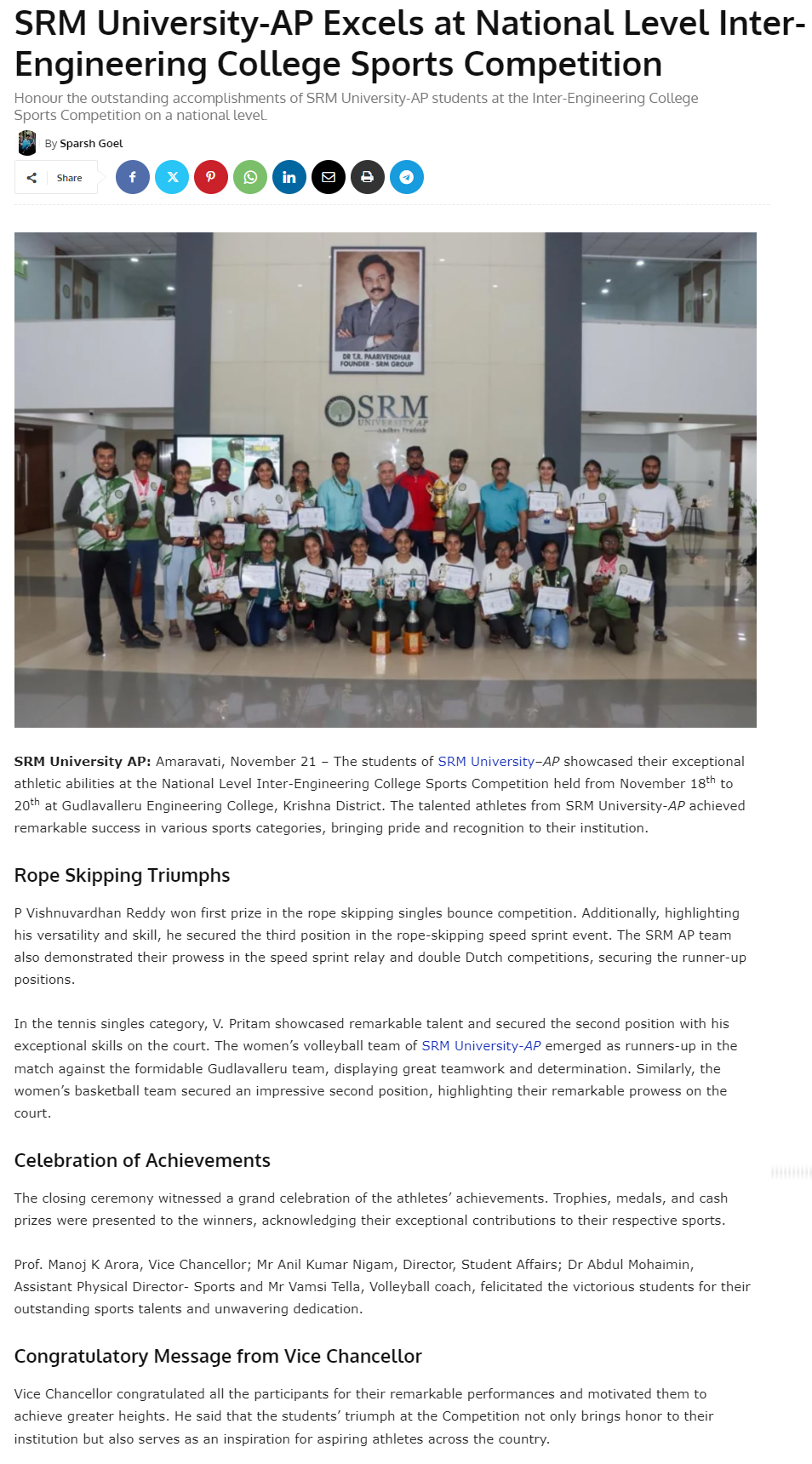
Eenadu
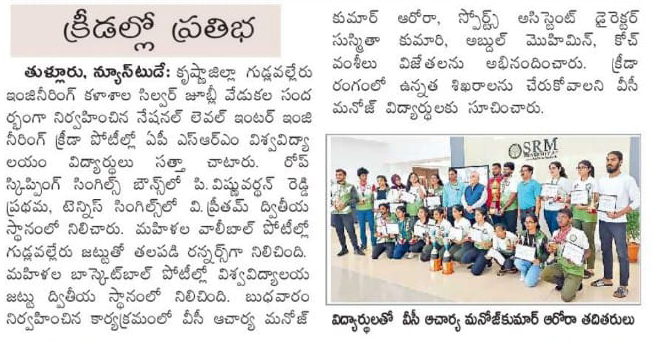
Vartha
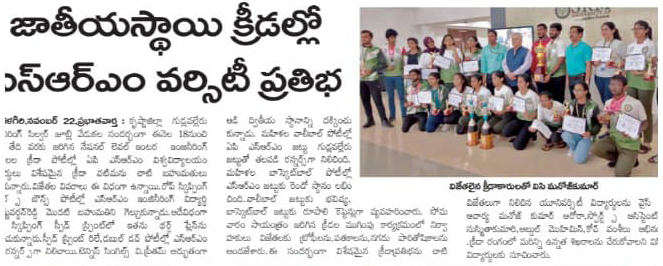
Visalaandhra
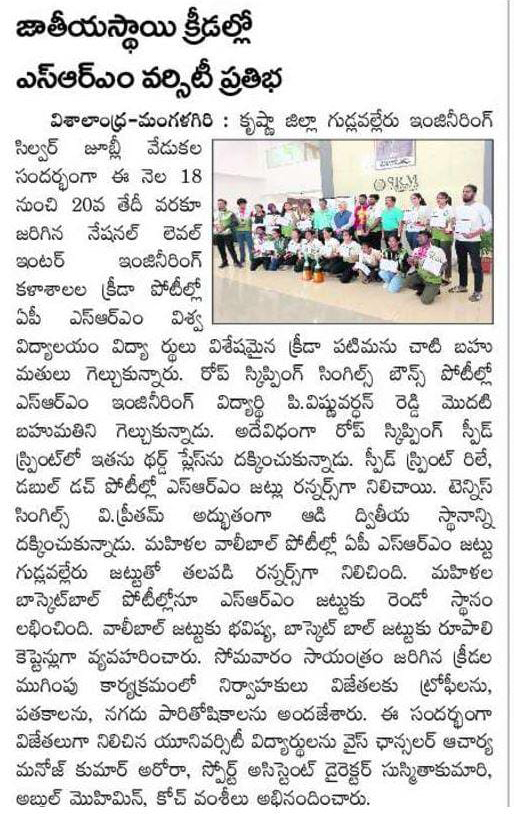
Andhra Patrika
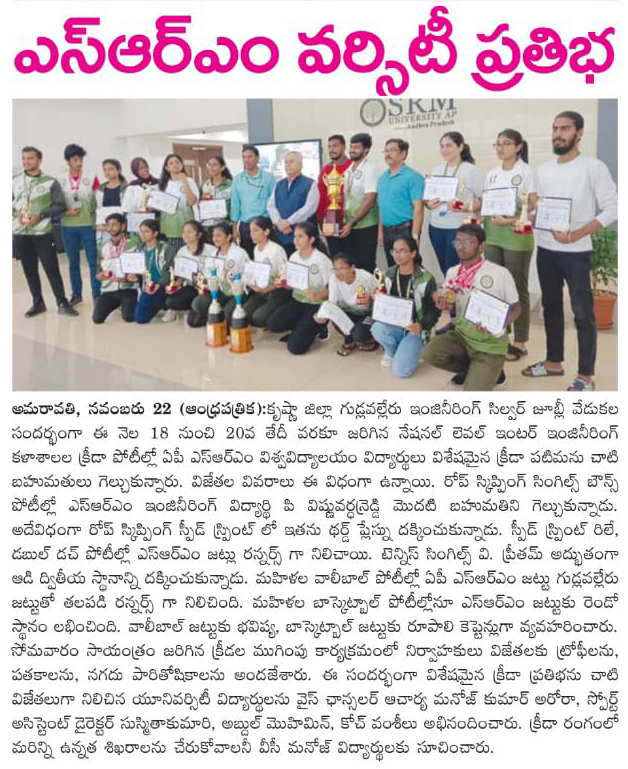
Andhra Prabha
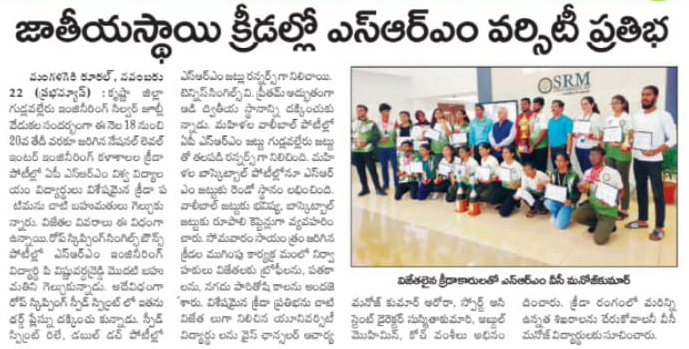
Prajasakthi
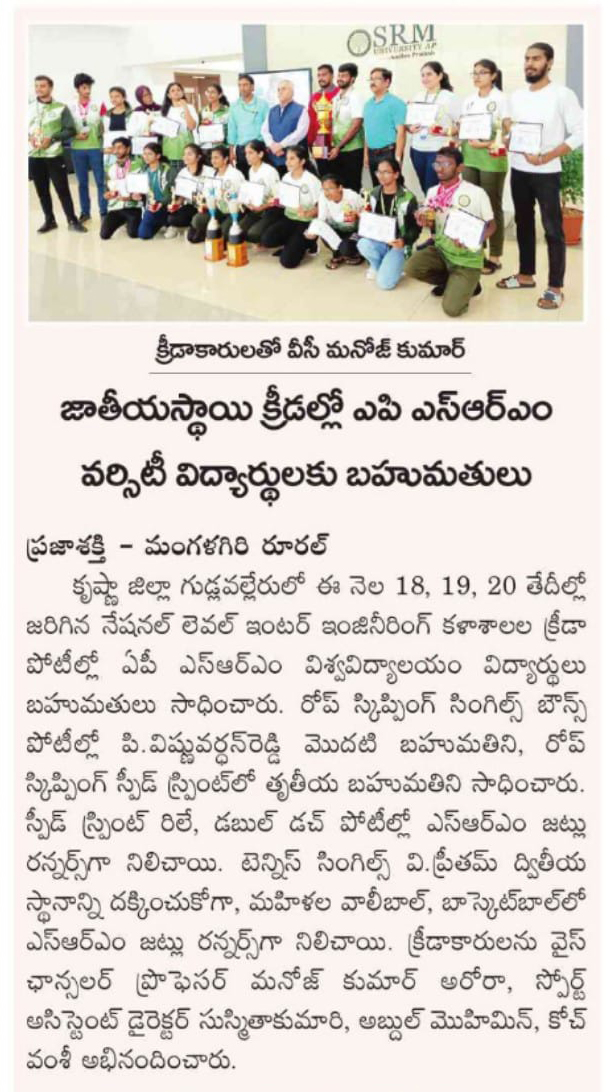
Surya
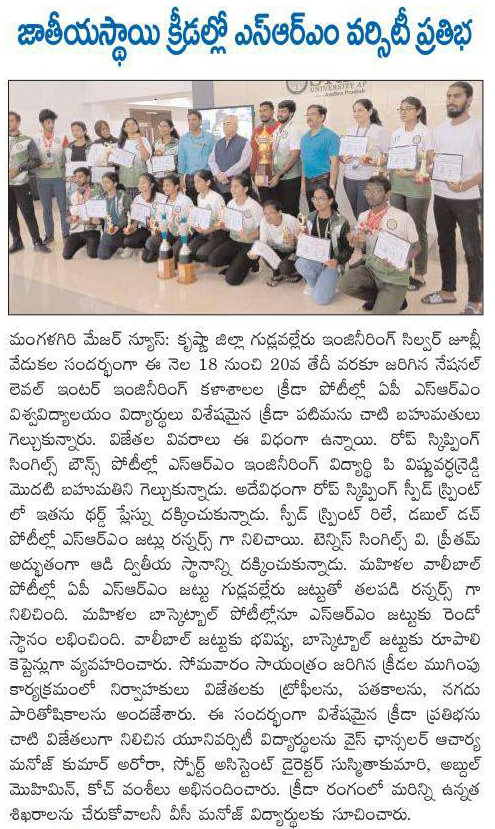
- Research Fellowship from Humboldt University of Berlin November 24, 2023
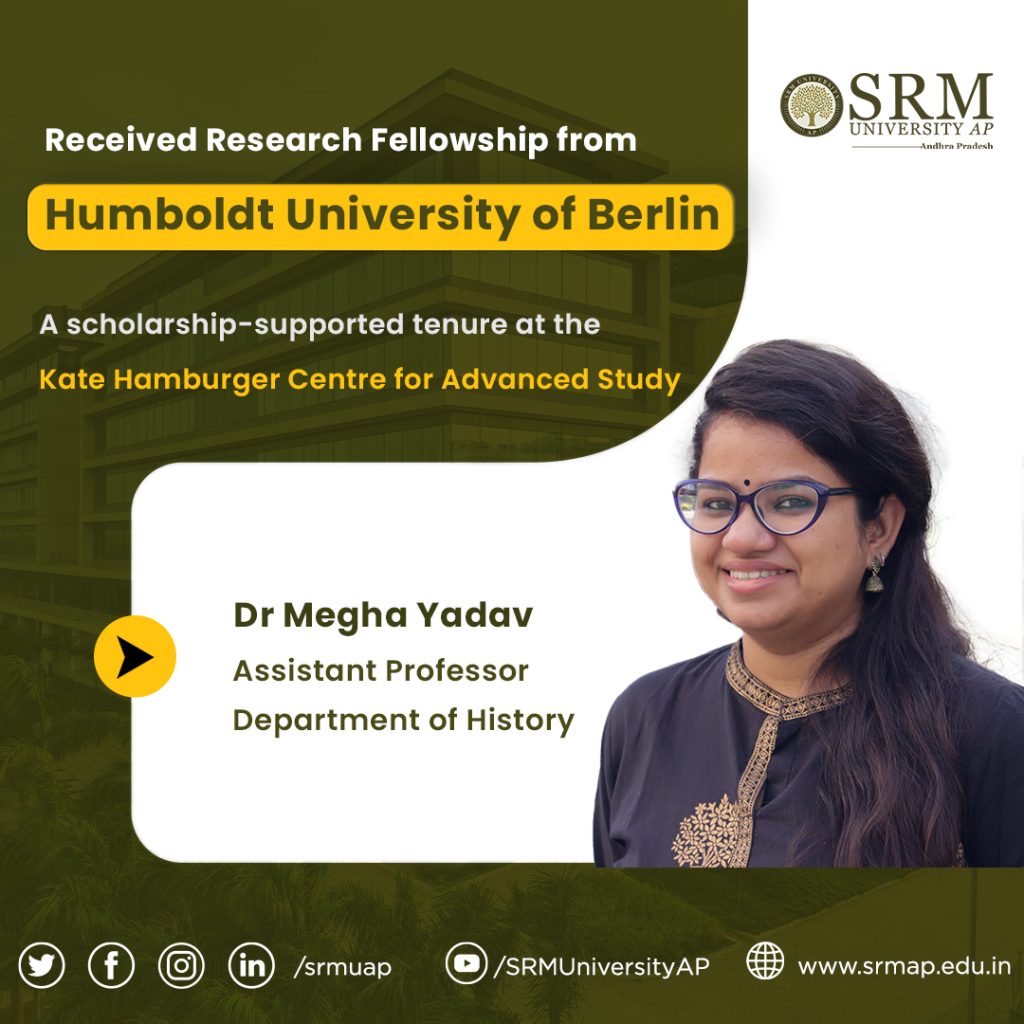
Dr Megha Yadav has received a prestigious fellowship from the Käte Hamburger Centre for Advanced Study, inherit.Heritage in Transformation, Humboldt Universität Zu Berlin, Germany. The fellowship allows for the undertaking of the research project, Visualising the Tradition, Preserving History: Material Practices in Tibetan Buddhism. This project takes an initiative to understand the ideas of heritage and history among the Tibetan Buddhist community by looking at the visual material and its heritage in Tibetan society to reach a nuanced picture of Tibetan history and heritage which keeps the Tibetan community at the centre of this understanding.
The project will attempt to understand the ways and methods of remembrance, preservation, and transmission of what Tibetan Buddhists consider to be their history. Most academic works have utilized Buddhist textual traditions to talk about Tibetan society, which has the inherent limitation of being one-dimensional. As a point of entry, this research will focus on thangka paintings as they create a very intimate window to people’s way of thinking about themselves, their universes, and their personal history. It was a ‘material’ to be showcased in public spaces, notably monasteries. It was meant for everyone to see, pay their respects, and take the image back with them in their minds and hearts. In a sense, these paintings were a showcase for the Tibetan Buddhist community.
This project will also pay attention to the changes brought about by 20th-century events, most notably colonization and the exile of the Dalai Lama and many Tibetans by inquiring into the changes brought into the idea and making of thangka paintings, raising questions about patronage, method, and content in the 20th century. An equally important intervention in the method and content of these paintings came with the spread of digital media platforms. While digital media has ‘democratised’ the making of thangka paintings, the question remains: what has it done to the process of making a thangka? How has the value associated with the paintings, as well as their making process, been changed by the technical medium? Has it impacted the content of these paintings? More importantly, what kind of changes have come into the community’s understanding of their past and present? These and any other issues that may come up during research will be addressed.
Continue reading → - MSc Environmental Science Students Secure Paid Japanese Internship November 23, 2023
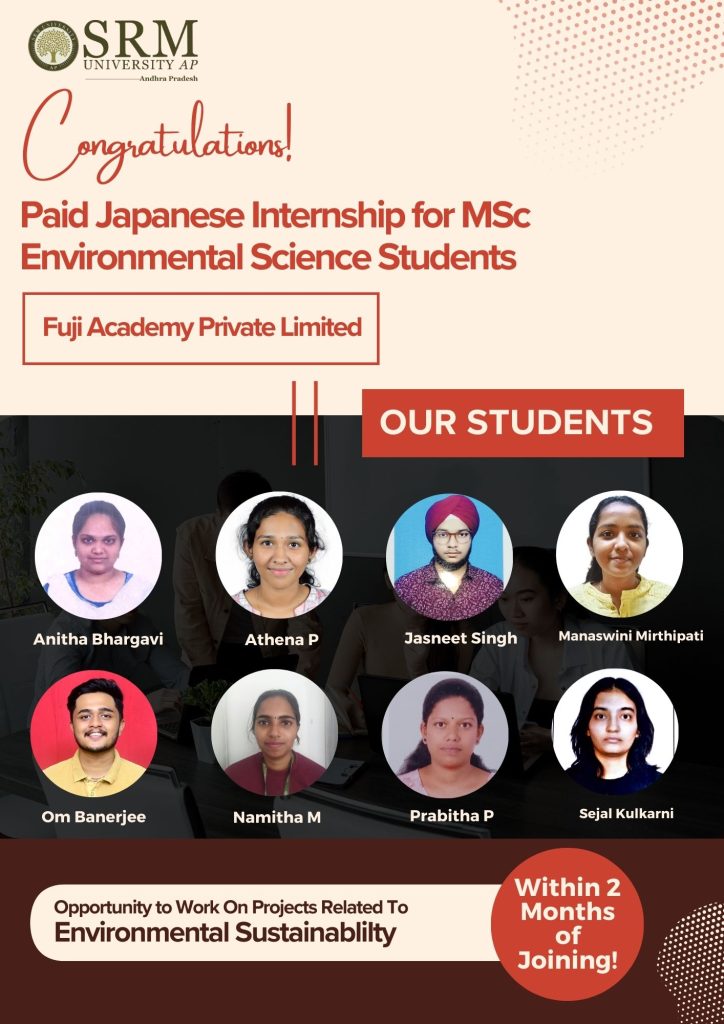
The Department of Environmental Science and Engineering takes pride in announcing that 8 students of MSc Environmental Science programme have bagged a paid internship in the Fuji Academy Private Limited, a prestigious Japanese company. The students shall work on projects related to environmental sustainability and participate in various engaging activities like workshops and training sessions, in addition to networking with different stakeholders in the sustainability sector. It is important to note that the students secured this internship within 2 months of commencing their MSc programme.
Continue reading →


